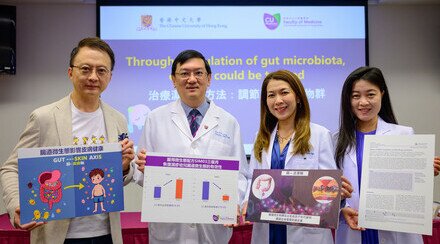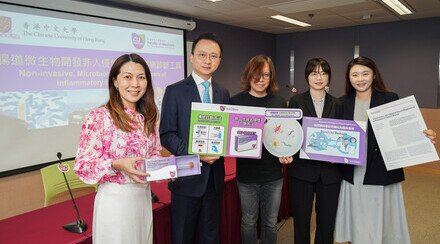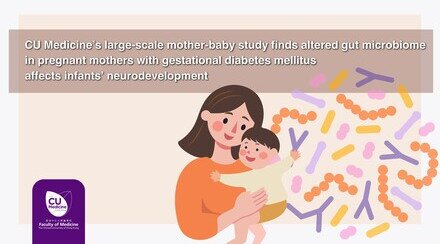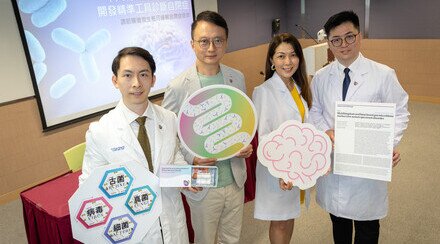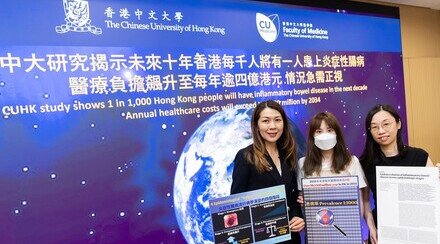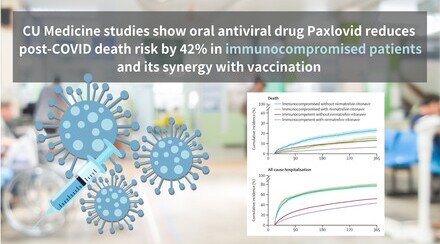CU Medicine’s population-based long COVID-19 survey estimates that over 400,000 recovered COVID-19 patients suffer from sexual dysfunction and reproductive problems
With support from the Hospital Authority, The Chinese University of Hong Kong (CUHK)’s Faculty of Medicine (CU Medicine) has conducted Asia’s largest population-based long COVID survey to understand long-term sequelae after acute COVID-19 infection. Results showed that 70% of the subjects still suffered from at least one long COVID symptom at a median of five months. Neuropsychiatric symptoms were the most common (38%), including poor memory, difficulty in concentrating, slow thinking, insomnia, hypersomnia, anxiety, negative moods, reduced motivation and changes in the sleep-wake cycle. In some patients, symptoms lasted for over three years.
This survey, featuring 10,043 subjects, was conducted from July to December 2022. Subjects’ ages ranged from 1 to 102 years old, and 97% had likely had the Omicron variant of SARS-CoV-2. Females, subjects aged 45 and older, and those with a history of COVID-19-related hospitalisation had the highest risk of long COVID.
Estimates over 400,000 long COVID patients suffer from reproductive problems
New findings from this survey include that 12% of long COVID patients reported reproductive problems, including menstrual irregularity, sexual dysfunction or increased sensitivity in the groin area, and 80% were women. If five million Hong Kong citizens have had COVID-19, it is estimated that about 420,000 may suffer from reproductive health concerns from long COVID. One in four subjects with reproductive symptoms reported that they had a major impact on their interpersonal relationships. More than half had not sought medical help or had not had access to sufficient information on long COVID treatment or prevention. Meanwhile, 70% felt overwhelmed or helpless in coping with these health conditions.
A study from the United Kingdom reported a two-fold increased risk of reduced libido and ejaculation difficulty in long COVID patients. There was concern that both male and female reproductive health may be affected by SARS-CoV-2, as the virus invades the target cell by binding to ACE2 receptors, which are widely expressed in reproductive organs such as the testicles, ovaries and uterus. SARS-CoV-2 infection may also disrupt the balance of male reproductive system hormones, leading to infertility problems.
Professor Francis Chan Ka-leung, Dean of Medicine and Director of the Centre for Gut Microbiota Research at CU Medicine, said, “Our survey provides important data on the huge impact of long COVID in Hong Kong. Long COVID is a common and pressing health issue. Health education and dissemination of relevant information to the public and healthcare practitioners are essential. Stronger support in the primary care system is also needed for referring patients with complex conditions to specialists. In the long run, we believe establishing a dedicated long COVID centre to manage complex cases will not only provide holistic treatment to patients, but also enhances research in long COVID treatment and prevention.”
Professor Siew Ng, CU Medicine’s Croucher Professor in Medical Sciences and Director of Microbiota-I Center (MagIC), said, “We must not ignore the debilitating symptoms of long COVID, which can affect physical, mental and sexual health. As modulation of the gut microbiome is emerging as a novel and promising treatment strategy for long COVID, we are conducting two clinical trials to evaluate the therapeutic effects of the CUHK-developed oral microbiome formula (SIM01) and faecal microbiota transplantation (FMT) in improving long COVID symptoms. Study results will be announced shortly.”








